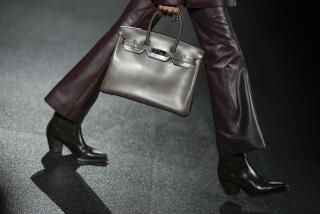Williams-Sonoma sues Amazon, accusing it of copying West Elm furniture
- Share via
Williams-Sonoma Inc. is suing Amazon.com Inc. in a challenge to the e-commerce giant’s private-label push that started with batteries, baby wipes and phone chargers and has expanded to include clothing, toys and high-end furniture.
Amazon’s Rivet line includes products that are “strikingly similar” to Williams-Sonoma’s West Elm brand, including a $300 orb chair the household goods maker introduced two years ago, according to Williams-Sonoma’s complaint.
“It is implausible Amazon could have conceived of a product line with nearly identical product designs which feature product names containing the very same non-descriptive terms WSI uses in connection with these products, other than by intentionally undertaking to copy WSI’s West Elm product line,” the suit says.
Amazon declined to comment on the trademark and patent infringement complaint, which was filed Friday in San Francisco federal court.
The lawsuit marks a new chapter in the tension between the world’s largest online retailer and major brands that have to decide how to interact with a company that can simultaneously be their partner and their competitor. Apple Inc. and many other companies have previously accused Amazon of not doing enough to fight counterfeit products sold on the site by independent merchants.
Extra inventory. More sales. Lower prices. How counterfeits benefit Amazon »
Williams-Sonoma’s lawsuit takes direct aim at Amazon, claiming it “unfairly and deceptively engaged in a widespread campaign of copying.”
The lawsuit signals Amazon will face more blowback from major brands as its private-label products move into more expensive categories in which established brands have invested heavily in design and marketing. Williams-Sonoma said three of the chairs it’s accusing Amazon of copying were designed in house and accounted for $8 million in Williams-Sonoma revenue in the first 10 months of the year.
“There’s no doubt we’ll see more lawsuits like this,” said Spencer Millerberg, a senior vice president at Edge by Ascential, an e-commerce consulting firm. He previously worked at Amazon. “The thing is, Amazon just doesn’t care. Vendor managers look at how big the legal risk is versus the sales they expect from the product.”
The complaint underscores Amazon’s power as a product search engine, which can glean insights about products customers want that it doesn’t sell based on the searches of hundreds of millions of consumers. It can offer similar products and promote them on its site and even advertise them on Google using the same keywords shoppers use on Amazon. Amazon’s private-label products pressure brands to sell and advertise their goods on the web store, lest their customers start buying similar products Amazon is making.
“Amazon can have manufacturers make something just close enough for a consumer to buy it and sell it for 30% less while making it just different enough to not violate a patent,” said James Thomson, a former Amazon executive who now advises merchants how to sell on the marketplace. “If someone searched Amazon for a Williams-Sonoma chair and couldn’t find one, they will market to them when they make a cheaper chair.”
More to Read
Inside the business of entertainment
The Wide Shot brings you news, analysis and insights on everything from streaming wars to production — and what it all means for the future.
You may occasionally receive promotional content from the Los Angeles Times.










